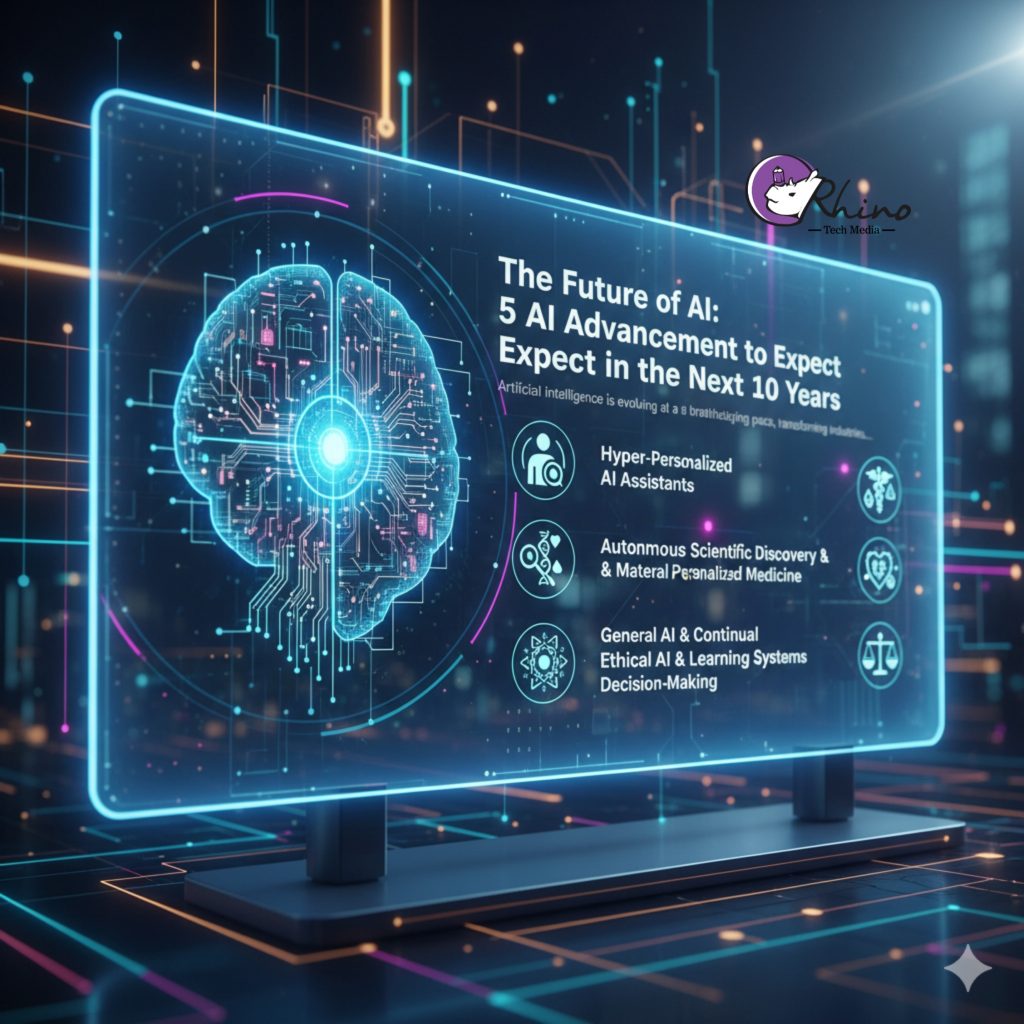The Future of AI: 5 Advancements to Expect in the Next 10 Years
Artificial Intelligence (AI) has already transformed the world in profound ways, reshaping industries, redefining how humans interact with technology, and accelerating innovation at an unprecedented pace. Yet, what we’ve witnessed so far may only be the beginning. Over the next decade, AI is expected to evolve from a tool of automation into a deeply integrated force that drives creativity, governance, and even ethical reflection. The following are five major AI advancements likely to emerge in the next ten years—each carrying both extraordinary potential and serious responsibility.
1. Artificial General Intelligence (AGI) and Beyond
One of the most anticipated frontiers is the rise of Artificial General Intelligence (AGI)—AI systems capable of performing any intellectual task a human can do, but faster and more efficiently. While today’s AI is “narrow” or task-specific, AGI would demonstrate fluid reasoning, contextual understanding, and adaptability across domains. This development could revolutionize research, education, and problem-solving. However, it also raises critical ethical and philosophical questions about control, consciousness, and coexistence. Over the next decade, we may not see fully autonomous AGI, but hybrid systems—where AI collaborates with human reasoning in near-human ways—are likely to appear in science, medicine, and strategic planning.
2. AI-Driven Healthcare and Human Longevity
Healthcare is on the brink of an AI revolution. Within ten years, AI will move from diagnosis to prevention and personalized treatment, using predictive analytics, digital twins, and genomic data. Advanced algorithms will be able to detect diseases before symptoms appear, simulate drug effects in silico, and tailor therapies to each individual’s biology. Robotic surgeries, powered by precision AI systems, will become safer and more accessible. Moreover, AI may extend human longevity by uncovering new insights into aging and cellular repair. The challenge will be ensuring privacy, equitable access, and the ethical handling of sensitive medical data.
3. AI and the Creative Renaissance
Contrary to fears that AI will stifle human creativity, the next decade will likely usher in an AI-assisted creative renaissance. Art, music, design, and storytelling will be co-created by humans and intelligent systems that can generate ideas, styles, and even emotional narratives. These tools will democratize creativity, empowering anyone to become an artist, filmmaker, or composer. Yet, as AI blurs the boundary between original and synthetic work, society will need to redefine authorship, authenticity, and artistic value. The future of creativity will not be about man versus machine—but about how humans channel machine intelligence to amplify imagination.
4. Autonomous Systems and the Future of Work
AI-powered autonomy is poised to redefine the workforce. From self-driving transportation and drone logistics to automated construction and agriculture, machines will increasingly handle dangerous or repetitive tasks. In parallel, knowledge work will evolve through intelligent agents capable of coding, legal drafting, or financial planning with minimal supervision. This transformation will create immense productivity gains but also significant social disruption. The next decade will demand a rethinking of education, labor policies, and social safety nets to ensure humans remain meaningfully employed in an AI-driven economy.
5. Ethical AI, Governance, and Human Alignment
As AI grows in power, ethical governance will become humanity’s greatest test. Nations, corporations, and citizens will need frameworks that ensure AI systems align with human values, transparency, and accountability. The emergence of global AI ethics councils, digital constitutions, and alignment research will be central to maintaining trust and safety. Over the next ten years, expect stronger regulations, explainable AI systems, and the integration of moral reasoning into machine design. The question will not only be what AI can do—but what it should do.
Conclusion
The next decade of AI advancement will be defined not merely by technological breakthroughs, but by the choices humanity makes in shaping them. Whether AI becomes a tool of empowerment or division depends on our collective wisdom. From AGI to creative collaboration, from healthcare innovation to ethical governance, the future of AI holds immense promise—if guided by intention, compassion, and courage. In the end, AI’s evolution will mirror our own: a reflection of how deeply we understand intelligence, not just in machines, but within ourselves.

